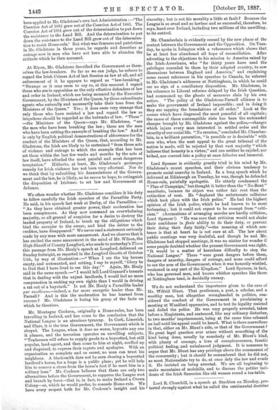Lord Spencer is evidently greatly tried in his mind by
Mr. Gladstone's recent speeches, and their obvious tendency to promote social anarchy in Ireland. In a long speech which he delivered at Edinburgh on Tuesday, he was, though he defended Home.rule, painfully apologetic. He utterly condemned the "Plan of Campaign," but thought it better than the " No-Rent " manifesto, because its object was rather fair rent than the extinction of rent. He "deplored the unfortunate collisions which took place with the Irish police." He had the highest opinion of the Irish police, which be had known to be most forbearing ; but it could not expect to be exempt from " criti- cism." (Accusations of arranging murder are hardly criticism, Lord Spencer !) "He was sure that criticism would not shake their confidence in pair ability to do their duty, or prevent their doing their duty fairly,"—the meaning of which sen- tence is that at heart he is not sure at all. The law about public meetings was very doubtful, and though he and Mr. Gladstone had stopped meetings, it was no Metter for wonder if some people doubted whether the present Government was right. "It would be a matter of herculean difficulty to stop the National League." There "were great dangers before them, dangers of anarchy, dangers of outrage, and none could afford to see the arm of the Government, when it was honestly wielded, weakened in any part of the Kingdom." Lord Spencer, in fact, who has governed men, and knows whither speeches like those at Nottingham tend, is decidedly uneasy.


































 Previous page
Previous page